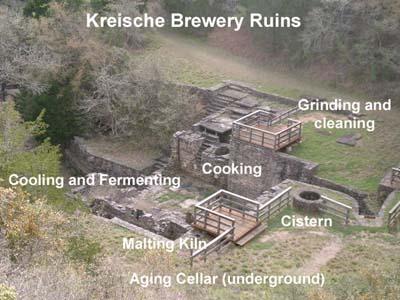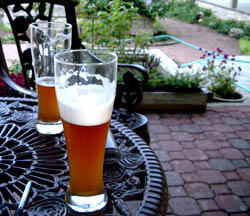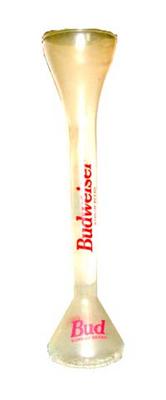In Britain beer, or ale, is brewed from traditional ingredients, matured by secondary fermentation in the container from which it is dispensed, and served without the use of added carbon dioxide. It is also called "cask-conditioned" and "naturally conditioned" beer. There are a number of different styles and types of ale varying from malty, lightly hopped milds to dark and bitter stouts and porters. There are some 2,500 different ales available from 500 brewers in the UK.
Here's an description of the qualities of the most common British beer styles:
Bitter
These are highly hopped ales, ranging from 1030 to around 1055 OG. The most common type of draft ale, low in carbonation. Best Bitters are usually over 4.1% ABV.
Mild
An ale of low gravity and hop rate, hence rounder, usually slightly sweeter, and distinctly less bitter on the palate and in aroma than more highly hopped bitters. Mild is usually (but not always) darker in colour than bitter, through use of a higher roast malt or caramel. There are considerable variations in mild styles.
Porter
A dark, slightly sweetish but ‘hoppy’ ale made with roasted barley: the successor of 'entire' and predecessor of stout. Originated in London around 1730 and by the end of 18th century was the most popular beer in England. The fashion for the pale ales of Burton-upon-Trent ended the popularity of porter in the mid 19th century. In recent years, a number of brewers have revived porter.
Stout
One of the classic types of ale, a successor in fashion to 'porter'. Usually a very dark, heavy, well-hopped bitter ale, with a dry palate, thick creamy head, and good grainy taste contributed by a proportion of dark roasted barley in the mash.
Bottle Conditioned Beer
This is real ale in a bottle and secondary fermentation takes place in the bottle as a result of yeast left in the mixture after boiling.
Local pubs used to sell only the beer of the brewery that owned them. The cask-conditioned ale was drawn directly from cool cellars, around 50F, which allows the full bouquet and aromas of a well-brewed ale to be experienced. But, sometime in the 60's, the big national breweries had gobbled up most local breweries and the whole scene changed. Local brews were replaced with national beers. Then came the imports. German lagers began to grow in popularity.
British brewers at first tried to ignore the trend and lobbied Parliament to allow the import of only small amounts of the European beers. But as demand grew the breweries saw dollar signs, or pound signs in this case, dancing before their eyes. They decided that the old bitter and mild ales should be brewed like the European beers, yeast removed, and carbonated with CO2.
In the early seventies, British ale lovers came along and formed The Campaign for Real Ale, or CAMRA. The group regalvanized the tastebuds and traditions of the British beer-drinkers. Their success in preserving British ales should be a model for any country attempting to preserve their own traditions.
Another important change is that the breweries have been required to release their stranglehold on their own pubs (and in many cases, sell them to private owners), and offer a far wider range of ales, lagers, stouts, local micro-brews and even pub-brewed ales (which of course is where it had all begun centuries before when every inn worth its own name brewed at least some of its own individual-recipe ales).
Sources:
Proper British Ale by David Yeadon
Visit Britain's Beer Styles page









